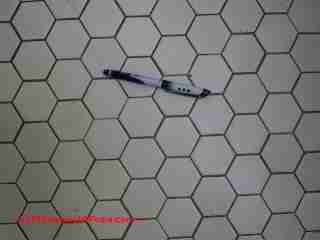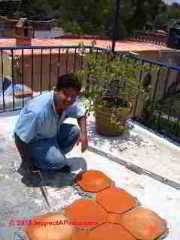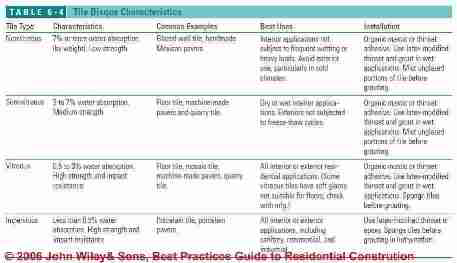 Guide to Using Ceramic & Stone Tile Floor Sealers
Guide to Using Ceramic & Stone Tile Floor Sealers
- POST a QUESTION or COMMENT about how to use grout sealer on ceramic tile floors & walls
This article discusses the use of sealers on ceramic and stone tiles used in kitchens and bathrooms.
We describe the strength but also the water absorption properties of ceramic tiles as well as the risks of water penetration into a floor, subfloor and even building structure at tile grout joints. We include a table of the water resistant properties of each type of ceramic tile.
InspectAPedia tolerates no conflicts of interest. We have no relationship with advertisers, products, or services discussed at this website.
- Daniel Friedman, Publisher/Editor/Author - See WHO ARE WE?
Ceramic & Stone Tile Sealer Advice for Bathrooms & Kitchens
 Our page top photo shows a ceramic tile bathroom floor installed in the Lotus Club, New York City. At left we illustrate a Mexican clay tile installation in process in San Miguel de Allende, Guanajuato, Mexico. There was much debate about whether or not we should use a sealer on this tile exposed to the weather.
Our page top photo shows a ceramic tile bathroom floor installed in the Lotus Club, New York City. At left we illustrate a Mexican clay tile installation in process in San Miguel de Allende, Guanajuato, Mexico. There was much debate about whether or not we should use a sealer on this tile exposed to the weather.
Ten years later (in 2015) we can report that the roof has not leaked, though algae has left black stains on these un-glazed terra cotta floor / roof tiles.
This article series discusses current best design practices for kitchens and bathrooms, including layout, clearances, work space, and accessible kitchen and bathroom layout, clearances, turning space, grab bars, controls, etc.
We include advice on choosing and installing kitchen countertops, cabinets, and kitchen or bathroom flooring, sinks, and other plumbing fixtures and fixture controls such as faucets. A list of kitchen and bath product manufacturers and sources is included.
[Click to enlarge any image]
This article includes excerpts or adaptations from Best Practices Guide to Residential Construction (Steve Bliss, J Wiley & Sons) , by Steven Bliss, courtesy of Wiley & Sons. As detailed in Chapter 6 of Best Practices Guide to Residential Construction (Steve Bliss, J Wiley & Sons) :
Strength and Water Absorption of Ceramic Tiles
The body of a ceramic tile, also called the bisque, is made by heating a mixture of clay and other additives in a kiln. In general, the longer the clay is fired and the higher the temperature, the denser and stronger the tile will be and the more impervious to water absorption.
Nonporous tiles that absorb little water will perform better in wet applications than porous tiles. The tile bisques manufactured according to ANSI standards are rated from nonvitreous to impervious (see Table 6-4).
[Click any image or table to see an enlarged version with additional detail, commentary & source citation.]

Guide to Using Kitchen or Bath Tile Sealers
A wide variety of proprietary sealers are available to protect natural stone against staining from grout, dirt, foods, and household products. In addition, some sealers help conceal minor scratches and increase slip resistance.
Some products require regular reapplication and may cause a surface buildup unless stripped. Penetrating oil-type sealers may change the color of some types of stone and can even trap dirt in the finish.
For best results, follow recommendations of the stone supplier and use products with an established track record.
Guide to Using Tile Grout Sealers
While latex or acrylic additives help protect the grout from staining, sealing the grout after it cures provides the best protection. There are a wide variety of products on the market.
Consult the directions regarding when and how often to apply. Many require reapplication annually or more often, depending on the specific use.
Regardless, to keep grout from darkening and staining, it will need regular cleaning with a grout cleaner or mild detergent.
Avoid oil-based soaps as they tend to
darken grout.
Kitchen and Bath Product Manufacturers, Sources, Associations
Ceramic Tile-Setting Material Manufacturer List
Bonsal American www.bonsal.com Setting compounds, grouts, preformed shower pans, curbs, and niches. Also, distributor of backerboards, isolation membranes, and other tile-setting products
Color Caulk, div. of Roanoke Companies Group www.colorcaulk.com Color-matched caulking
Custom Building Products www.custombuildingproducts.com Elastomeric and liquid-applied membranes, self-leveling underlayments, setting compounds, and grouts
Laticrete International www.laticrete.com Trowel-on membranes, self-leveling underlayments, setting compounds, grouts, and sealants
Noble Company www.noblecompany.com CPE sheet membranes, trowel-on membranes, clamping ring drains, and preformed slopes, niches, and curbs
Mapei www.mapei.com Trowel-on and sheet membranes, self-leveling underlayments, setting compounds, grouts, and color-matched sanded caulks
Ceramic Tile Backerboard Producers
Custom Building Products www.custombuildingproducts.com Wonderboard cement backerboard, Easyboard cement and polystyrene lightweight backerboard, and Rhinoboard fiber-cement backerboard
Georgia-Pacific Gypsum www.gp.com/build Denshield gypboard backer with glass-matt facing
James Hardie Building Products www.jameshardie.com Fiber-cement backerboard
National Gypsum www.nationalgypsum.com Permabase lightweight cement and polystyrene backerboard
Schluter Systems www.schluter.com Kerdi tile membrane goes directly over drywall or other substrates
T. Clear Corp./Fin Pan Inc. www.finpan.com Util-A-Crete lightweight concrete backerboard
U.S. Gypsum www.usg.com Durock cement backerboard
W. R. Bonsal www.bonsal.com Extruded polystyrene backerboard with fiberglassreinforced cement facing
- - Adapted with permission from Best Practices Guide to Residential Construction (Steve Bliss, J Wiley & Sons) .
...
Continue reading at FLOOR TILE SETTING COMPOUNDS or select a topic from the closely-related articles below, or see the complete ARTICLE INDEX.
Or see these
Recommended Articles
- BATH & KITCHEN DESIGN GUIDE - home
- CERAMIC TILE DAMAGE REPAIR
- FLOOR DAMAGE DIAGNOSIS
- FLOOR DESIGNS: KITCHEN & BATH
- FLOOR FRAMING & SUBFLOOR for TILE
- FLOOR, RESILIENT VINYL or CORK
- FLOOR, STONE, GRANITE, MARBLE, AGGLOMERATE
- FLOOR TILE, CERAMIC
- FLOOR TILE HISTORY & INGREDIENTS
- FLOOR TILE INSTALL on CONCRETE
- FLOOR TILE SEALERS, CERAMIC, STONE
- TILED WALKING SURFACE SLIP HAZARDS
- FLOOR TILE SETTING COMPOUNDS
- FLOOR TYPES & DEFECTS
- FLOORING MATERIALS, AGE, TYPES
- GROUT INSTALLATION, TILE
Suggested citation for this web page
FLOOR TILE SEALERS, CERAMIC, STONE at InspectApedia.com - online encyclopedia of building & environmental inspection, testing, diagnosis, repair, & problem prevention advice.
Or see this
INDEX to RELATED ARTICLES: ARTICLE INDEX to BATH & KITCHEN
Or use the SEARCH BOX found below to Ask a Question or Search InspectApedia
Ask a Question or Search InspectApedia
Questions & answers or comments about how to use grout sealer on ceramic tile floors & walls.
Try the search box just below, or if you prefer, post a question or comment in the Comments box below and we will respond promptly.
Search the InspectApedia website
Note: appearance of your Comment below may be delayed: if your comment contains an image, photograph, web link, or text that looks to the software as if it might be a web link, your posting will appear after it has been approved by a moderator. Apologies for the delay.
Only one image can be added per comment but you can post as many comments, and therefore images, as you like.
You will not receive a notification when a response to your question has been posted.
Please bookmark this page to make it easy for you to check back for our response.
IF above you see "Comment Form is loading comments..." then COMMENT BOX - countable.ca / bawkbox.com IS NOT WORKING.
In any case you are welcome to send an email directly to us at InspectApedia.com at editor@inspectApedia.com
We'll reply to you directly. Please help us help you by noting, in your email, the URL of the InspectApedia page where you wanted to comment.
Citations & References
In addition to any citations in the article above, a full list is available on request.
- Best Practices Guide to Residential Construction, by Steven Bliss. John Wiley & Sons, 2006. ISBN-10: 0471648361, ISBN-13: 978-0471648369, Hardcover: 320 pages, available from Amazon.com and also Wiley.com. See our book review of this publication.
- Our recommended books about building & mechanical systems design, inspection, problem diagnosis, and repair, and about indoor environment and IAQ testing, diagnosis, and cleanup are at the InspectAPedia Bookstore. Also see our Book Reviews - InspectAPedia.
- In addition to citations & references found in this article, see the research citations given at the end of the related articles found at our suggested
CONTINUE READING or RECOMMENDED ARTICLES.
- Carson, Dunlop & Associates Ltd., 120 Carlton Street Suite 407, Toronto ON M5A 4K2. Tel: (416) 964-9415 1-800-268-7070 Email: info@carsondunlop.com. Alan Carson is a past president of ASHI, the American Society of Home Inspectors.
Thanks to Alan Carson and Bob Dunlop, for permission for InspectAPedia to use text excerpts from The HOME REFERENCE BOOK - the Encyclopedia of Homes and to use illustrations from The ILLUSTRATED HOME .
Carson Dunlop Associates provides extensive home inspection education and report writing material. In gratitude we provide links to tsome Carson Dunlop Associates products and services.

